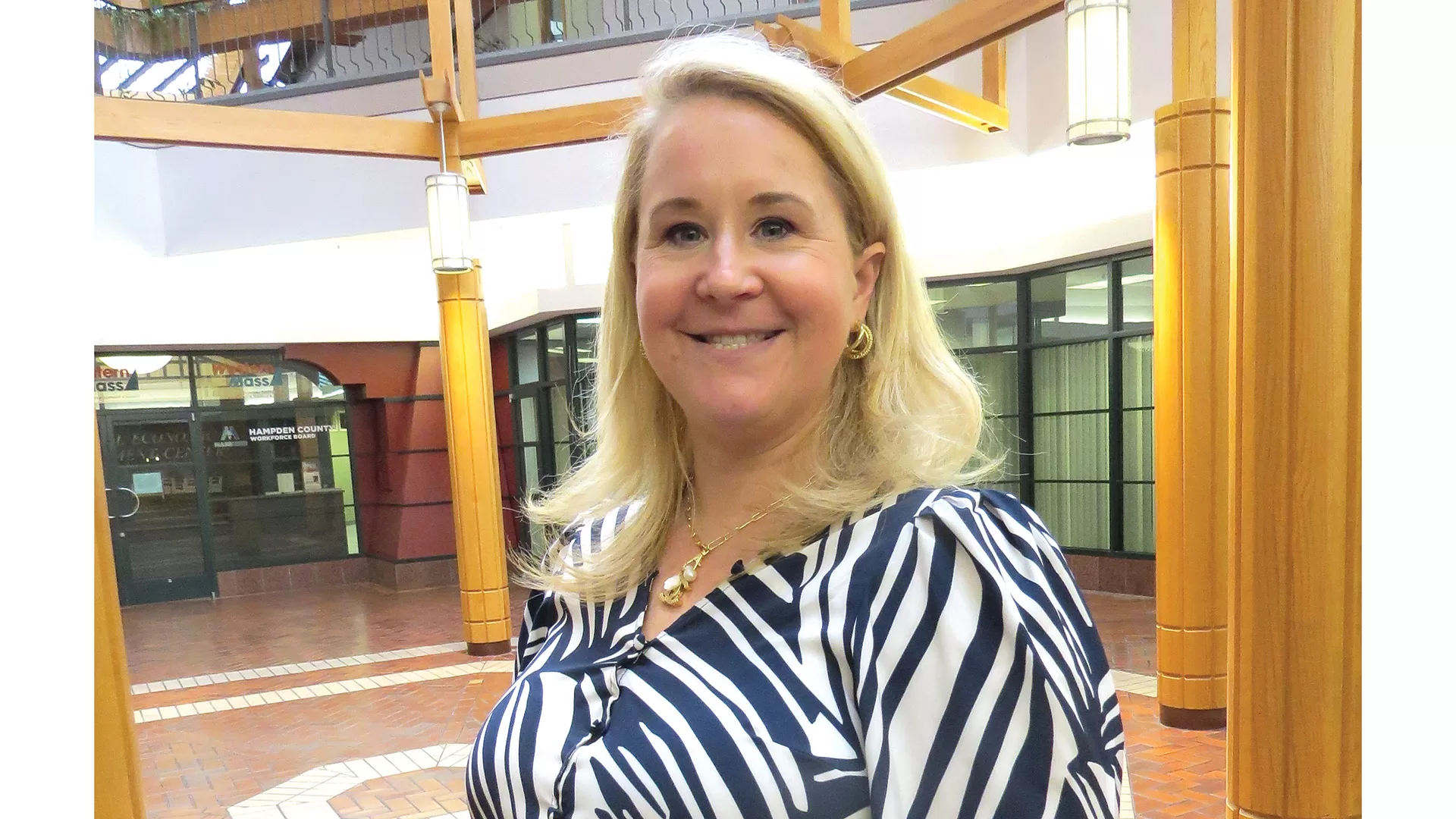The State of the Bay State

Brooke Thomson said her story is of the kind the Bay State and its leaders like to write.
Hailing from the Midwest, she graduated from Mount Holyoke College, went to law school in Boston, and then made the decision to start her career and raise a family here.
It wasn’t easy, she recalled, noting that she needed roommates when she got her first apartment, and housing in the Boston area, as well as countless other expenses, made those early years — and even the later ones — a stern challenge.
But she stayed and is now president and CEO of Associated Industries of Massachusetts (AIM), a position from which she reflects on, and often retells, her story while noting, with large doses of frustration and even dismay, that it is becoming a harder story to write today.
Indeed, some of the thousands who graduate from Bay State colleges and universities each year are opting not to start their careers here, said Thomson, who sat down recently with BusinessWest to discuss the state of the Bay State. And some who did start here are finding it too difficult to stay amid sky-high prices for everything from homes to daycare and tax burdens that are far less friendly than many other states, including several in the Northeast.
This exodus, if you will, is one of many forces, most of them interconnected in some ways, that are colliding at what is an inflection point for the state, said Thomson, a critical time in its history, when the dust has largely settled from COVID and its aftermath, and this state, like all others, must devise a business plan, if you will, for coping with a new set of realities.
“Businesses, municipal leaders, state leaders, and federal leaders must make sure we’re putting in place the economic incentives and the regulatory pathways so that we can continue to have a strong economy in Massachusetts.”
These forces include the momentous shift in how and where people work post-pandemic, a swing toward remote work and hybrid schedules that is impacting everything from commercial real estate to hospitality and service businesses in central business districts in cities from Boston to Springfield and everywhere in between. They also include demographics — everything from smaller high-school graduating classes to huge numbers of retiring Baby Boomers — a persisting workforce crisis impacting most all sectors of the economy, falling state tax revenues, transportation issues led by the famously unreliable MBTA, a housing crisis that is impacting most of the 351 cities and towns in the Commonwealth, high energy costs and the growing need to address climate change, and, of course, the spiraling cost of living, punctuated by sky-high home prices, not just in Boston, but in an ever-wider radius around the city and many other parts of the state as well.
A poignant example of how many of these forces are intertwined came late last month, when Boston Mayor Michelle Wu proposed legislation to increase commercial property tax rates amid a decline in property values post-pandemic — and as many buildings suffer from remote-work-related issues — in an effort to protect residents from what she called “sudden and dramatic tax increases.”
The matter went to a subcommittee last week, where its fate is in question, especially in an election year, and amid warnings from real-estate trade groups and business leaders that the move would increase the burden on an already-struggling office market and could deter new investment.

Brooke Thomson says housing — and the need to build more of it — is among the many challenges confronting the Bay State at this critical time.
Wu’s proposal, and the reaction to it, are examples of how complicated these problems are — neither side is really in a position to absorb a higher tax burden — and how elected leaders, the business community, and even residents are going to have to work collaboratively in this time of stern challenges, Thomson noted, adding that the state’s businesses, despite some rumors to the contrary, cannot shoulder the burden itself.
“I think this is a critical time because there is so much uncertainty and because we are coming out of the COVID bubble,” said Thomson, who took the helm at AIM at the start of this year. “Businesses, municipal leaders, state leaders, and federal leaders must make sure we’re putting in place the economic incentives and the regulatory pathways so that we can continue to have a strong economy in Massachusetts.
“I think we’ve seen elsewhere in the country that, depending on what actions are taken, certain cities that used to be centers of business and growth are no longer there,” she went on. “Part of this was out of our control, part of it was this COVID bubble where everything was shut down and then people re-evaluated how they worked and where they worked, and businesses re-evaluated where they located and what their space looks like and where they draw talent from. But as we are moving out of that, we must collectively figure out the right sauce, the right recipe, sort of speak, for success.”
For this issue, BusinessWest talked with Thomson about this recipe and the ingredients that might go into it.
Work in Progress
Thomson said she can usually tell what day it is — or isn’t — by the volume of traffic in and around Boston.
While it’s still difficult to get where one wants to go most of the time, Mondays and Fridays are at least somewhat better, she said, adding that, by and large, these are the days when many who can and do work a hybrid schedule are not in the office. And the impact of that many people working from their home offices or dining-room tables is felt not just on the roads, but in the office towers in that city, where valuations are falling, and the countless diners, restaurants, and service businesses that rely on foot traffic from people working in the city.
“Tuesday, Wednesday, and Thursday — that’s when people are coming in,” she said. “And that presents a whole host of challenges; it exacerbates transit, and if you have a workforce, like ours, that’s in this sandwich generation where they’re caring for children but also caring for parents, not only do we not have enough support there, but our systems are not set up where daycare facilities have a Tuesday-Wednesday-Thursday schedule.”
“There are a lot of things we have to move on quickly, meaning right now, to set ourselves up to be in a place of continued growth so that, 10 years from now, some of these trends that we’ve seen, like outmigration and tax-return dips, don’t continue. But it’s going to require some strong action right now.”
While Boston is the poster child for the challenges that have come post-pandemic, the same issues are being seen in communities across the state and in businesses of all sizes and in most every sector.
Indeed, she said AIM, which employs more than 25 people full-time, exemplifies the current colliding forces and trends. It has seen a few of its valued employees leave the agency and the Commonwealth for more affordable states, she said. Meanwhile, it is preparing to move into new quarters and reduce its overall footprint to reflect a need for less space amid more remote work.
“Like a lot of businesses in the wake of COVID, we re-evaluated what our footprint should look like and where we should be,” she said, adding that the agency is slated to move in June into space that is slightly smaller, but also features more “collaborative space,” as she called it, and more gathering and event space amid fewer private offices.
As for losing employees to other states, “we’ve lost two people in the past year who were under 30,” she said. “It’s not because they didn’t love Massachusetts; it’s not because they didn’t love AIM. One moved to Tennessee, and one moved to Texas because those states are more affordable, and they have the prospect of buying a home.”
Extrapolate these recent developments across the state and its business community, and it’s easy to see why this is a critical juncture for the Commonwealth, Thomson said.
She can cite some positives and possible reasons for optimism — everything from the tax cuts Gov. Maura Healey signed into law last fall to projections that falling state tax revenues may pick up in the last few months of the fiscal year; from persistently low unemployment rates to signs on Beacon Hill that leaders there understand what needs to be done.
“I remain cautiously optimistic because many municipal leaders, and our administration, are laser-focused on providing incentives to try to make it very clear to the business community that Massachusetts wants businesses to be here and wants businesses to grow,” she said. “And they recognize that, for there to be good jobs and good quality of life and affordable housing, we have to have a strong economy.
“I haven’t seen that messaging in recent years as strong as I’m hearing it now,” she went on. “The question is … will the actions that go along with that be put into place and be effective? From AIM’s perspective, that’s why we’re working alongside the administration and the Legislature to say, ‘now is the time to act.’”
Elaborating, and citing ways in which in the state and its leaders need to act, she listed the housing bond bill proposed by Healey, as well as the so-called ‘Mass Leads’ legislation, an economic-development bill that contains incentives for businesses.
“We have to look at this because, as we see the demographic shift, as we see folks retiring, we’re going to have a real problem if we’re not saying to those young folks, ‘this is where you want to stay and work and raise a family.’”
“There are a lot of things we have to move on quickly, meaning right now, to set ourselves up to be in a place of continued growth so that, 10 years from now, some of these trends that we’ve seen, like outmigration and tax-return dips, don’t continue,” she went on. “But it’s going to require some strong action right now.”
It’s About Time
Thomson kept repeating those words ‘right now’ for emphasis, and they apply to everything from housing to how the state will meet its energy needs in the future as it moves on from nuclear power and some fossil fuels to natural gas and clean-energy sources such as solar, wind, and hydro, for which infrastructures must be built.
“If it’s not done quickly, 10 years from now, 15 years from now, I don’t think we’re going to be at a point where we have as much control over turning the ship around,” she told BusinessWest, adding, again, that the responsibility for turning the ship, and the costs involved, must be borne by all constituencies, and not simply the business community.
“We have to be thoughtful and intentional about how everyone has a role,” she went on. “What AIM has said consistently is that this cannot be a burden that is carried by the business community alone. We know that our businesses are really taxed right now; they’re at a point where many of them are just barely getting by, and they’re in a real competition for talent and resources.”
While she’s generally optimistic that the ship can, in fact, be turned, she is troubled by much of what she’s seeing, especially the exodus of talent to other states. She noted that 22- to 35-year-olds are leaving the state at a rate of 35%, a number significantly higher than it has been historically.
And they’re leaving primarily because of the high cost of living, she said, noting that, while it’s always been expensive to live in Greater Boston — she had to work two jobs to afford her first home — it is much harder to make ends meet now, as evidenced by those two AIM employees who packed the car and moved south and west.
“That’s what I worry about — that’s your talent, those are your creative minds,” Thomson said. “Those are the folks who are going to bring the innovation that has made our economy so great. And we’re not selling them on staying here in Massachusetts.”
And these young people are leaving just as the Baby Boomers are leaving the workforce, she went on, noting that the state now has what would be called an older workforce, with an average age around 40.
“We have to look at this because, as we see the demographic shift, as we see folks retiring, we’re going to have a real problem if we’re not saying to those young folks, ‘this is where you want to stay and work and raise a family,’” she noted. “I really do worry about it, and it’s worse in certain areas and worse in certain industries; the average age of a utility lineman is 57 years old. How are we going to make the energy investments, upgrades, and transitions we need if we don’t have the workforce that’s capable of doing it?”
There are ongoing initiatives to generate interest in such fields, Thomson went on, but the challenge is the full slate of issues that must be addressed simultaneously — and soon.
Which begs the question: where to start?
“The hard thing is, we’re going to have to do a lot of things at once,” she said. “We must take aggressive actions on housing because it’s going to take long, and the price of not acting now is that, once you start losing folks at a high rate, they’re not going to come back. And even if we can build more housing and find creative ways to make some affordable housing, Massachusetts is going to be more expensive than some states.”
It’s the same with the other issues on that long list as well, Thomson went on, adding that, when it comes to housing, new businesses, or other forms of change, communities will need to be willing to adjust — or suffer the consequences.
“Communities that say, ‘this is what my community looks now, change is hard, and we don’t want to adapt,’ those communities are going to lose out to those who are willing to be more adaptive,” she noted. “And then the question is … do we have enough consensus as a state, enough communities willing to step up and do it, that we’re successful?”








 The cannabis industry is off to a fast and quite intriguing start in the Bay State, and two new categories of license have particular potential to move this sector in new directions: one for home delivery of cannabis products, and another for social-consumption establishments, or cannabis cafés.
The cannabis industry is off to a fast and quite intriguing start in the Bay State, and two new categories of license have particular potential to move this sector in new directions: one for home delivery of cannabis products, and another for social-consumption establishments, or cannabis cafés.


